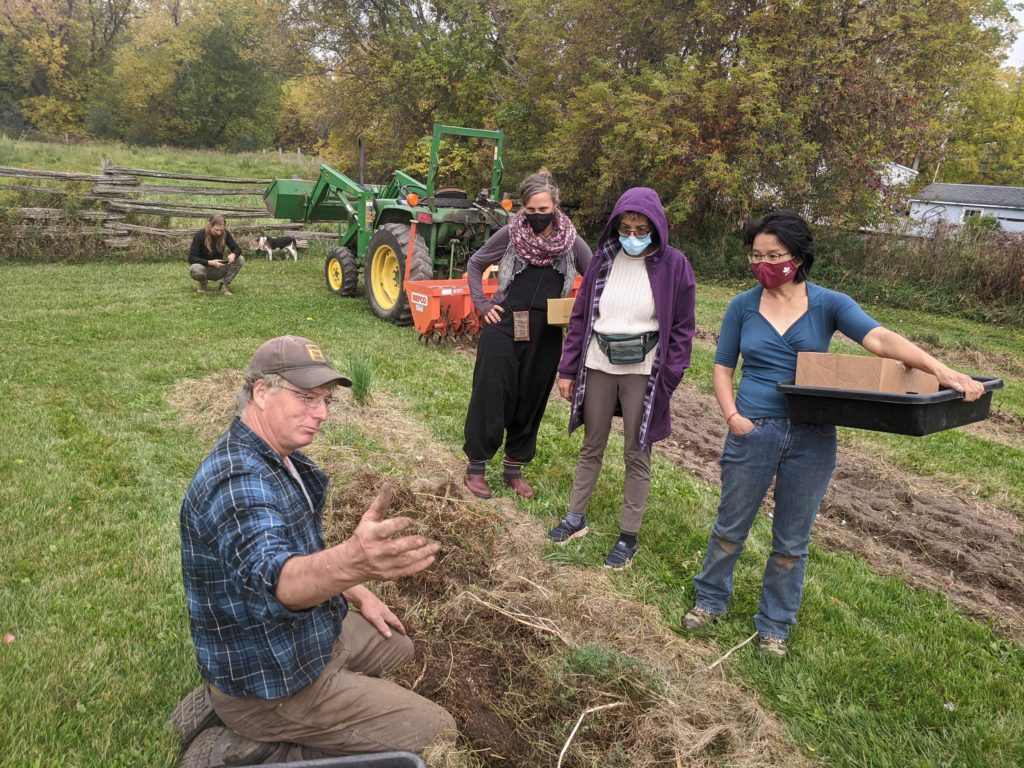
Written by Nolan Scharper
On Saturday October 10th, our Food Corps team visited Owen Goltz’s farm. Owen, who heads the 305 chapter of the National Farmer’s Union, had requested that we help him plant garlic, harvest potatoes, and discuss the challenges he and other farmers in Southern Ontario are facing as a result of the Covid-19 pandemic.
While our daily news cycle offers a plethora of new information on the adverse health effects and spreading contagion of the coronavirus, when it comes to highlighting Covid-19’s dire effects on our food system, our media is strangely silent. This lack of coverage is especially problematic considering that the number of Canadians who are food insecure is expected to double from 4.4 to 8.8 million people as a result of the pandemic.
A major factor contributing to this rise in food insecurity is a shortage of farm labour. The risk of infection has prevented many farmers from hiring and housing workers who annually harvest our global supply of fresh food. According to the UN, we are facing the worst food shortage in decades in part because of this shortage, and our country is not immune to the shockwaves of this global crisis. In Caledon, Owen has witnessed farmers churning over crop land that was supposed to be harvested because of the dearth in labour. Simultaneously, urban communities such as St. James Town in downtown Toronto are increasingly reliant on food banks to sustain themselves during this pandemic. It is this discontinuity between farmers plowing under fresh produce in our rural communities and people in our cities struggling to feed themselves that the Eco Just Food Network is striving to transform.
The food corps team is a pilot project designed to help farmers like Owen harvest produce that would otherwise go to waste. Our team of 6 people was able to accomplish in a few hours what would have taken Owen over a day to complete on his own. Therefore Owen, who usually has to sell his high quality food at a premium in order to break even, was able to give us a bountiful harvest of potatoes, carrots, and squash in exchange for our labour.
Owen is convinced he can sell this pilot project to other farmers, who he claims, would be more than happy to plant extra crops so long as they knew that there would be enough workers to harvest them the following season. Not only do farmers benefit, Owen notes, but also people who cannot normally afford to buy such healthy and nourishing fresh food. Owen, like many small scale farmers, is concerned that his food is not getting into the hands of the people that need it the most. On his own, with limited resources and a farm to look after, Owen cannot address these concerns. With the help of something like the Food Corps, however, he can ensure that the food he takes pride and joy in growing is reaching the people who need it the most.
After we had finished our farm trip, we brought our collected harvest to the Children’s Peace Theatre in the east end of Toronto, where a group of African and Indigenous youth and their allies have set up an encampment in support of the Land Back actions reverberating across the country. After dropping off our food, we knelt beside the encampment’s Sacred Fire and offered tobacco. Folks at the encampment were celebrating a hundred days of occupation and the fire had burned ceaselessly throughout this time.
I thought about all the work that went into keeping this fire alive and healthy, the countless hours spent humbly and quietly tending to its needs. Sacred Fires, much like the movements for justice they symbolize, cannot survive without food. Helping to feed these fires and nourish these movements with humility, grace, and joy is therefore an incredibly important path of allyship and friendship, one in which we are so grateful for the opportunity to participate.